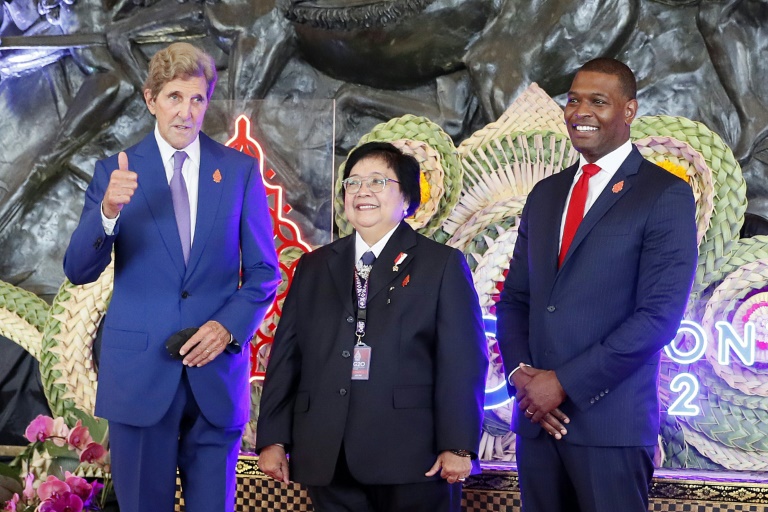Some of the world's top economies and emerging nations are being increasingly hit by record heat, flash floods and droughts
Group of 20 climate talks in Bali ended without a joint communique Wednesday despite host Indonesia warning the world’s leading economies they must act together to combat a warming planet or risk plunging into “uncharted territory”.
The one-day meeting on the resort island concluded with Indonesia’s environment chief saying G20 chair Jakarta would only issue a summary of the forum’s aims, reflecting divisions between its members over how to tackle climate change.
The failure to agree a unified statement came at the end of a month in which more than 1,000 people died in Pakistan from flooding blamed on climate change and after a drought exacerbated by a record heatwave spread across half of China.
At a closing press conference, Indonesian Minister of Environment and Forestry Siti Nurbaya Bakar said the summary would detail the forum’s “shared commitment and shared steps”.
It is a similar move to that seen in finance talks in Indonesia last month where the host — which maintains a neutral foreign policy — issued a chair statement after ministers disagreed over Russia’s responsibility for global economic turmoil in light of its invasion of Ukraine.
“We cannot say that,” Bakar told AFP when asked if there was no communique because of geopolitical disagreements.
“But the chair summary is something we can achieve given the geopolitical issues and (given) some countries cannot be flexible on certain issues.
“Just like in many working groups, issues on Russia and Ukraine have become geopolitical tension.”
Another source close to the meeting said G20 members “did not manage to reach a joint communique” and most countries started their speeches by condemning Russia’s invasion of Ukraine, though there were no walkouts or clashes when the Russian representative spoke.
“The reason that killed the communique from the start is the presence of Russia today,” the source told AFP.
Moscow only sent a deputy minister for economic development to the talks, according to a list of attendees seen by AFP.
In her opening remarks Bakar had told delegates that “global environmental problems require global solutions” and nations “cannot solve those global environmental problems on our own”.
Countries around the world are being increasingly hit by record heat, flash floods and droughts — phenomena that scientists say will become more frequent and intense due to climate change.
– ‘Hostile actors’ –
Research published this month showed the Arctic has warmed nearly four times faster than the rest of the planet over the last 40 years, suggesting climate models and governments are underestimating the rate of polar heating.
“We cannot hide from the fact that the world is facing increasingly compounding challenges,” Bakar said, referencing energy price spikes and global food shortages.
“We know that climate change could become an amplifier and multiplier of the crises.”
She added that climate change “would not only wipe out all development progress that has been achieved over past decades, particularly in emerging economies, but it would also propel us over an environmental tipping point into uncharted territory where no future will be sustainable”.
At the meeting were US Special Presidential Envoy for Climate John Kerry, Britain’s climate minister Alok Sharma and officials from India, Australia, Italy, Brazil, Japan, South Korea and the European Union among others.
China –- the world’s biggest emitter of greenhouse gases –- only sent a vice minister of ecology and environment, with higher-level officials staying home because of the Covid-19 pandemic.
The meeting was a prelude to a November leaders’ summit which Indonesian President Joko Widodo has said Russian counterpart Vladimir Putin will attend despite Moscow’s isolation after invading Ukraine.
Britain said the Russian military assault had exacerbated energy problems, with Sharma arguing it showed “the vulnerability of countries relying on fossil fuels controlled by hostile actors”.
Climate security had become synonymous with energy security, he said.
The United Nations’ next climate change talks will take place in Sharm el-Sheikh, Egypt in November.









